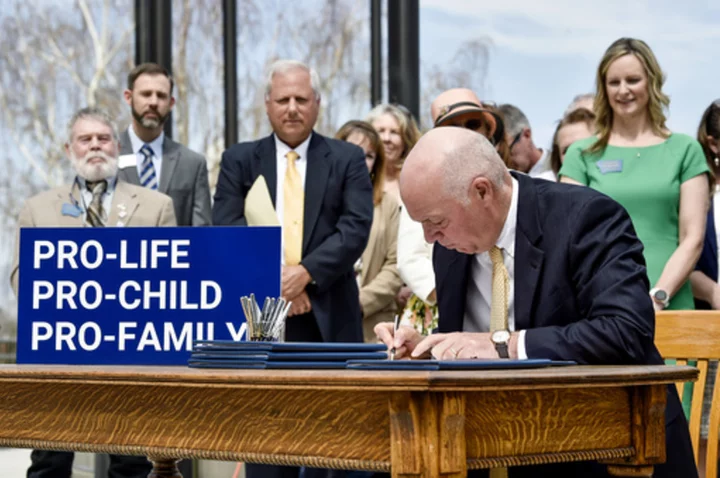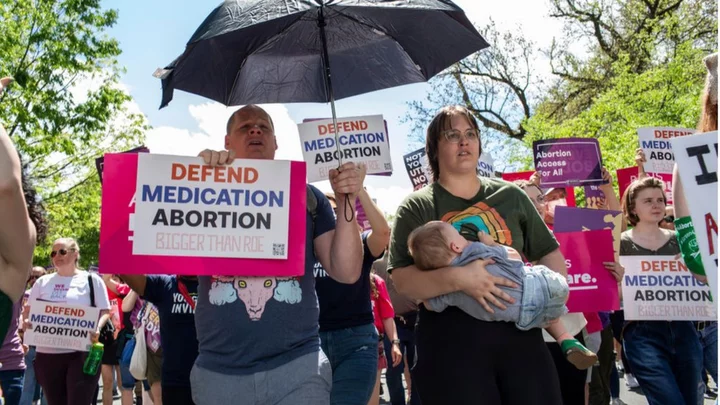
US judges appear skeptical of preserving access to abortion pill
A US federal appeals court panel appeared skeptical on Wednesday of preserving access to a...
2023-05-18 06:28

New rule targets college programs that leave grads with low income, high debt
College programs that leave graduates underpaid or buried in loans would be cut off from federal money under a proposal issued by the Biden administration on Wednesday
2023-05-18 06:24

Republican-appointed federal judges grill FDA in mifepristone hearing
A combative three-judge panel at one of the most conservative courts in the country grilled attorneys for the federal government and a drug manufacturer as anti-abortion activists continue a legal battle to overturn the government’s approval of a widely used abortion drug. On 17 May, the case against mifepristone returned to the Fifth Circuit Court of Appeals in New Orleans, where attorneys for the US Department of Justice and drug manufacturer Danco Laboratories faced skeptical Republican-appointed judges hearing oral arguments in a case that could upend abortion care for millions of Americans. Within seconds of her opening argument, Justice Department attorney Sarah Harrington was interrupted by Judge James Ho, a Donald Trump appointee, who challenged her description of the legal challenge against the drug’s approval by the US Food and Drug Administration. “I don’t think there’s ever been any court that has vacated an FDA determination that a drug is safe to be on the market,” she replied. “FDA can make that determination based on exercising its own scientific expertise, but it’s not a court’s role to come in and second-guess that expertise.” “Why not focus on the facts,” Judge Ho said, “rather than this ‘FDA can do no wrong’ theme.” The judges repeatedly interrupted Ms Harrington and appeared sympathetic to the plaintiffs: an anti-abortion group represented by influential right-wing legal group Alliance Defending Freedom, whose senior counsel Erin Morrow Halley – the wife of Republican senator Josh Hawley – baselessly asserted that medication abortion is “particularly dangerous”. Judge Jennifer Walker Elrod, who was appointed by George W Bush, also took a moment to chastise lawyers for their “unusual remarks” in filings objecting to the widely derided lower-court decision from a former right-wing activist attorney who was appointed to the federal bench by Mr Trump. Judge Elrod suggested their criticisms amounted to personal attacks and suggested that the attorney retract the statements and apologise. “Those statements reflect our view that the district court was very outside the bounds,” said Jessica Ellsworth, an attorney for Danco. “I don’t think those remarks, any of them, were intended as any personal attack.” The judges are not expected to rule immediately. But a decision from the panel judges – each with a history of support for abortion restrictions – is likely to return the case to the US Supreme Court, which has paused any action on mifepristone until the legal challenge plays out. In her arguments, Ms Hawley conflated the risk of serious complications from mifepristone – which is less than 1 per cent – with the risk that a medication abortion failed and would then require medical attention. Her arguments suggested that doctors are enduring a moral harm by providing abortion care, without evidence that doctors have been forced to do so, while also claiming that the FDA illegally approved the drug when it was approved more than 20 years ago. The judges repeatedly questioned the FDA’s approval process for mifepristone, which plaintiffs argued was done too hastily through an expedited process that is typically reserved for treating serious or life-threatening illnesses. But the FDA did not do that with mifepristone; it took years of study before the FDA’s approval. The part of that process that the agency invoked for mifepristone’s approval allowed the FDA to add safety restrictions, such as a requirement that physicians be able to diagnose ectopic pregnancies. But judges appeared to argue that because pregnancy is not an illness, mifepristone should not have been approved through that process at all, repeating plaintiffs’ false claim that the FDA called pregnancy a “life-threatening illness.” “When we celebrated Mothers’ Day, were we celebrating illness?” Judge Ho said at one point. “The arguments today demonstrated in detail that the case has no legal or scientific merit and should have been laughed out of court from the very start,” Jennifer Dalven, director of the ACLU Reproductive Freedom Project, said in a statement. “Unfortunately, the deck is stacked as the judges hearing this case are well known for their extraordinary hostility to abortion,” she added. “The whole point of the case is to prevent anyone in America, no matter where they live, from using a medication that has been safely used in this country for decades and is used in most abortions today.” Major medical groups and research from hundreds of studies over the last two decades have confirmed the overwhelming safety and efficacy of the drug, one of two drugs used in a two-drug protocol for a medication abortion, the most common form of abortion care in the US. Studies show it is as safe to use as common over-the-counter pain relievers like ibuprofen and acetaminophen, and the protocol for medication abortion is used in more than 60 other countries. The drug was first approved by the FDA in 2000 and is approved for use up to 10 weeks of pregnancy. A vast majority of abortions occur within the first nine weeks of pregnancy. From 2019 through 2020, nearly 93 per cent of all abortions were performed before the 13th week, according to the US Centers for Disease Control and Prevention. Mifepristone is also used to treat miscarriages. Roughly 10 per cent of clinically recognised pregnancies end in miscarriages, according to the American College of Obstetricians and Gynecologists. The American College of Obstetricians and Gynecologists and the American Medical Association also joined a brief in the challenge opposing arguments from anti-abortion groups. Last year, Alliance Defending Freedom filed a lawsuit in US District Court in Amarillo, Texas on behalf of a group of anti-abortion activists incorporated as the Alliance for Hippocratic Medicine, which was organised that same month with an address in Amarillo. The Alliance Defending Freedom also led the challenge at the Supreme Court that ultimately struck down Roe v Wade. In April, US District Judge Matthew Kacsmaryk – a former right-wing activist lawyer who was appointed to the federal judiciary by then-President Trump – issued a ruling to suspend the FDA’s approval of mifepristone, which was immediately challenged by abortion rights advocates, providers, major medical groups, drug manufacturers and the Biden administration. An appeal landed at the Fifth Circuit court, which has jurisdiction over the Amarillo court. A three-judge panel blocked a part of the judge’s ruling, and a subsequent ruling at the Supreme Court paused the lower-court ruling as the legal challenge continues. Read More North Carolina Republicans approve 12-week abortion ban as sweeping restrictions spread across US South Nebraska Republicans approve combined gender-affirming care ban and anti-abortion bill after epic filibuster Anti-abortion laws harm patients facing dangerous and life-threatening complications, report finds A Texas man sued his ex-wife’s friends for allegedly helping her with an abortion. Now they’re suing him Louisiana Republicans refuse rape and incest exceptions to state’s sweeping anti-abortion law What is mifepristone? The widely used pill in the abortion rights battle at the Supreme Court
2023-05-18 06:21

The Lasting Legacy of Elizabeth Stuart, the ‘Winter Queen’ of Bohemia
The daughter of King James VI and I was Electress Palatine of the Rhine and Queen of Bohemia, and through her grandson, the founder of a new British ruling dynasty.
2023-05-18 05:25

'I feel amazing and I'm super happy': Liam Payne says he's been sober 'over 100 days' and is working on a new album
'I've been making an album for a change which is quite fun. It's been good, so I'm excited to bring it out here,' said Liam Payne
2023-05-18 04:56

Biden administration invests in carbon capture, upping pressure on industry to show results
The Biden administration is announcing an investment of $251 million in carbon capture and storage projects in seven states
2023-05-18 03:59

Mets No. 1 prospect leaves Scott Boras for a hip-hop artist
Mets top prospect Francisco Alvarez will be singing "A Summer Without You" to Scott Boras all season long.New York Mets top-ranked prospect Francisco Alvarez is changing his representation and changing the vibes: he's dropping Scott Boras in favor of a less distinguished but more ...
2023-05-18 03:28

Manchin Scrubs Vote on Energy Agency Nominee Over Gas Stove Rule
Senator Joe Manchin pulled his support for an Energy Department nominee in protest of the agency’s plan to
2023-05-18 03:25

Planned Parenthood asks Montana judge to block law that bans 2nd-trimester abortion method
Planned Parenthood of Montana asked a judge to temporarily block a law that bans the abortion method most commonly used after 15 weeks of gestation
2023-05-18 00:58

What comes next for abortion pill in US?
A court in New Orleans is hearing a case that may pull a commonly used abortion pill from the market.
2023-05-18 00:58

North Carolina Republicans approve 12-week abortion ban as sweeping restrictions spread across US South
Republican lawmakers in North Carolina voted to override the governor’s veto of a bill that outlaws abortion at 12 weeks of pregnancy, restricting abortion access in a state that has been a haven for abortion care in the year after the US Supreme Court’s decision to reverse Roe v Wade. In neighbouring South Carolina, lawmakers have continued debate before voting on a more-restrictive measure that would ban nearly all abortions after roughly six weeks of pregnancy, before many people know they are pregnant, adding to a streak of abortion restrictions across the US South. More than a dozen states, mostly in the South, have outlawed most abortions or severely restricted access within the year after the Supreme Court’s ruling in Dobbs v Jackson Women’s Health Organization, which revoked a constitutional right to abortion care that was affirmed for nearly half a century. Abortion rights restrictions in North Carolina and a six-week ban in South Carolina would dramatically change the map for abortion access in the US, where abortions are banned in most cases from Texas to West Virginia and along the Gulf Coast. “In the more than a dozen states with bans, women have been turned away from emergency rooms, left with no choice but to travel hundreds of miles for the care they need, and faced complications that put their lives and health at risk. Like those laws, the North Carolina ban will harm patients and threaten doctors for providing essential care,” White House press secretary Karine Jean-Pierre said in a statement on 17 May. She called the North Carolina measure a “dangerous bill that is out of touch with the majority of North Carolinians and will make it even more difficult for women to get the reproductive health care they need.” “We’ve already seen the devastating impacts that state abortion bans have had on the health and lives of Americans living under these draconian laws,” she added. Health workers joined protesters at the North Carolina Capitol in Raleigh on 17 May as lawmakers in the Republican-controlled state legislature convened to override a veto from Democratic Governor Roy Cooper, who has spent the last several days campaigning for GOP lawmakers to break from the party and drop the challenge to his veto. In a video posted online, the governor named four Republican lawmakers who he said made campaign promises to protect access to abortion. “They say this is a reasonable 12-week ban. It’s not,” he said in the video. “The fine print requirements and restrictions will shut down clinics and make abortion completely unavailable to many women at any time, causing desperation and death.” Much of the coverage surrounding the North Carolina legislation has centred around a now-Republican lawmaker who previously campaigned against abortion restrictions when she was a Democrat, up until April. State Rep Tricia Cotham joined the Republican Party last month after campaigning for her seat as a Democratic candidate and earning the endorsement of EMILY’s List, an influential abortion rights organisation. Her party switch delivered Republicans a veto-proof majority in the House. Ms Cotham has spent years campaigning against abortion restrictions, with powerful testimony about abortion rights and her own medically necessary abortion experience, saying in one widely shared 2015 speech that “my womb and my uterus is not up for your political grab.” In a statement following the vote, the governor said that “North Carolinians now understand that Republicans are unified in their assault on women’s reproductive freedom, and we are energized to fight back on this and other critical issues facing our state.” Lawmakers in the House and Senate voted on party lines to reverse the governor’s veto. The bill includes exceptions for pregnancies from rape or incest or if there is a “life-limiting anomaly” in the fetus. It also will require in-person physician visits at least 72 hours before a procedural abortion, and doctors must also make real-time views of fetuses available and allow patients to listen to embryonic cardiac activity. North Carolina lawmakers approved the anti-abortion law while lawmakers in Nebraska debated a measure that coupled a 10-week abortion ban with a bill targeting gender-affirming care for trans youth, a proposal that inspired a nearly three-month-long filibuster in an effort to block it. Republican lawmakers ultimately broke through the filibuster on Tuesday night and voted in favour of the combined bill, which will head to a final round of votes before it heads to the desk of Republican Governor Jim Pillen, who intends to sign it into law. Meanwhile, in Louisiana, lawmakers recently refused to add rape and incest exceptions to its anti-abortion law, one of the most restrictive in the country. State lawmakers also overwhelmingly rejected attempts to clarify medical exceptions in the law, including a measure that would specifically allow providers to remove an ectopic or molar pregnancy, which cannot result in a successful birth. Read More Nebraska Republicans approve combined gender-affirming care ban and anti-abortion bill after epic filibuster Anti-abortion laws harm patients facing dangerous and life-threatening complications, report finds
2023-05-17 23:51

Beyoncé's 'Renaissance' tour has begun. Here's what to know before you go
It's finally time to unleash our inner alien superstars. Here's what "Renaissance" tour-goers need to know before the show hits their hometown.
2023-05-17 23:18
